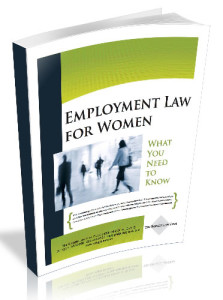 If you witnessed a co-worker being sexually harassed by your boss, would you tell the truth to human resources if they asked you about it? Though you may have many concerns that may prevent you from getting involved, state and federal laws are written to encourage you to speak up.
If you witnessed a co-worker being sexually harassed by your boss, would you tell the truth to human resources if they asked you about it? Though you may have many concerns that may prevent you from getting involved, state and federal laws are written to encourage you to speak up.
Antidiscrimination laws are written to protect those who complain of discrimination and those who participate in proceedings to investigate or litigate discrimination claims. The goal is to encourage people to come forward and to make enforcing the laws easier. If witnesses could be silenced by threats of retaliation by employers, many cases would not make it far in the legal process.
At what point a person falls under the protection of antiretaliation law was recently litigated in a Mississippi retaliation case filed in federal court. The trial court dismissed the case. Although overall the appellate court agreed with the view of the employer, it found that the case needed to go back to the trial level so a jury, not the judge, could make important decisions determining whether the plaintiff was protected by the law.
The Facts of the Case
Mekeva Tennort worked as a cleaner for Rite Way Service, Inc., which provided cleaning services to the Biloxi school system. Tennort had a good employment record, according to the appellate decision, up until shortly after she did the right thing and reported harassing actions and words by a supervisor to a co-worker. She worked during the school years from 2009 to 2012.
According to the lawsuit, at the start of the 2011–12 school year, Tennort was assigned to a new supervisor, Willie Harris. She witnessed Harris do and say things she disagreed with.
- Harris pretended to smack co-worker Linda Quarles’s bottom and said, “Ooh wee.” Tennort did not immediately report the incident or talk to either person because she “didn’t want to get involved.”
- Less than a week later, Tennort and Quarles were together when Harris warned Quarles that she should not have a cell phone in her back pocket because that would violate Rite Way policy. Tennort was surprised by the comment because Harris could tell what was in Quarles’s pocket and stated, “Somebody must be looking real hard at [Quarles’s] behind.” Harris responded that Quarles’s pants were tight. She was offended and pulled at her pants to show that they weren’t tight. Quarles told him not to be concerned about how tight her pants were. Harris then said, “I’m a man, I’m gonna look,” which visibly upset Quarles.
Quarles complained about Harris to a police officer stationed at their school. She named Tennort as a witness. Rite Way investigated the complaint. Alex McCullom, the employer’s project manager for the school system, questioned Tennort about the “I’m gonna look” incident. According to Tennort, McCullom tried to convince her not to report what she witnessed because “you know what they do to people who do stuff like this,” and he remarked that Quarles was “nothing but trouble.”
Tennort wrote her report anyway and gave it to McCullom. The federal Equal Employment Opportunity Commission (EEOC), which filed the case on behalf of Tennort, took the position that her providing that report to Rite Way triggered the antiretaliation provisions of Title VII (which prohibits sex discrimination in employment and sexual harassment) because she opposed what she saw as discrimination.
Two days later, Harris was assigned to another school. Harris’s brother-in-law became the new supervisor for Quarles and Tennort. During the next five weeks, Tennort was issued three written warnings and up to two oral warnings for alleged poor job performance, the only warnings she’d ever received while at Rite Way. She was fired in September 2012. The EEOC’s position was that the warnings were fabricated and a pretext for the retaliation. Rite Way claimed they were the result of complaints from its client, the school system.
The Trial and Appellate Decisions
The trial court dismissed the lawsuit because to be protected against retaliation, those opposing discrimination must reasonably believe that what they’re opposing is a violation of the law, in this case Title VII. The judge decided that Tennort could not reasonably believe that Harris’s actions violated the law. On appeal, the EEOC argued that some lower standard should apply, though the appellate court stated that the EEOC was ambiguous as to what that standard should be.
Under Title VII’s antiretaliation section, protected activity is defined as one of two things:
- opposing any unlawful employment practices (the opposition clause), or
- filing a charge or testifying, assisting, or participating in any manner in an investigation, proceeding, or hearing (the participation clause).
Before the appellate court, the EEOC argued that Tennort’s August 18 report was protected by the opposition clause. As such, Tennort needed to show not only that she opposed something but also that what she opposed violated Title VII. The EEOC argued unsuccessfully that since Tennort’s report was in response to an inquiry by her employer, she should only need to show something less than a reasonable belief that Harris’s actions and words violated the law, not that they actually violated Title VII.
The appellate court disagreed. Here, it agreed with the employer and the lower court that the right standard was that a “reasonable belief” of a violation of the law must be shown for someone opposing discrimination to be protected against retaliation. But the appellate court sided with the EEOC that there were important facts that could only be considered by a jury when considering that legal standard and that the judge overstepped his bounds in dismissing the case when he found that there was no basis for a reasonable belief.
The appellate court ruled that given all the facts of the case, the issues of what Harris said and did, given his status as a supervisor, and whether his actions and words violated the company’s sexual harassment policies were issues of fact for a jury to decide, not an issue of law for the judge to decide, regardless of whether Tennort had a reasonable belief that Harris violated Title VII. Therefore, the appellate court remanded the case to the trial court.
Summing It Up
- To be protected from retaliation in a discrimination case, you can oppose the alleged discrimination, participate in an investigation or legal proceeding, or both.
- If you’re opposing the actions of an employer to get legal protection against retaliation, you must reasonably believe that what you’re opposing violates antidiscrimination law.
- Whether you have a reasonable belief would be determined on all the facts of the situation.
If you have opposed discrimination in some way or participated in an investigation or proceeding concerning discrimination and you believe you have suffered retaliation as a result, contact our office. We can talk about your situation, the facts of your case, the application of the law, and your best options for moving forward.

 [/popup]
[/popup]





